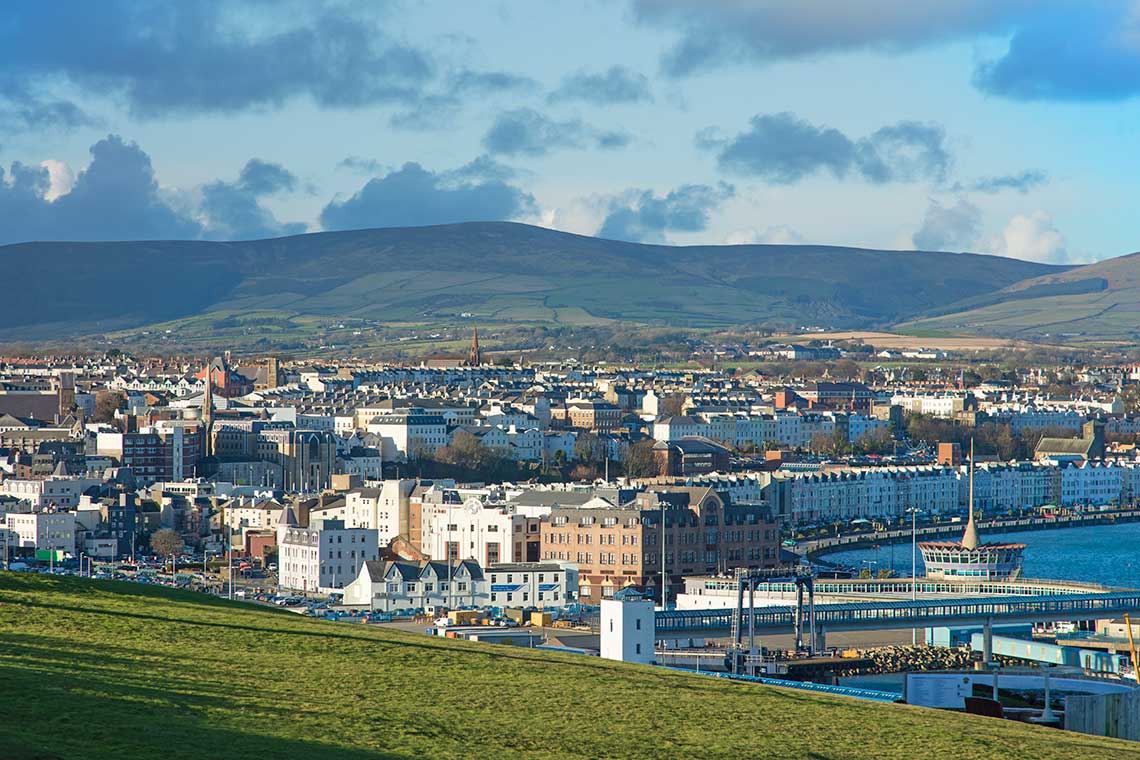Incorporate A Company In Isle of Man In 2025

The Isle of Man, spanning just 572 square kilometers, combines breathtaking natural beauty with modern amenities. Its capital, Douglas, is a hub of economic and cultural activity. Renowned for the annual Isle of Man TT motorcycle race and its status as a UNESCO Biosphere Reserve, the island offers a harmonious blend of tradition and progress.
Politically, it is not part of the United Kingdom but enjoys a close relationship, with its own government, known as the Tynwald, one of the world’s oldest continuous parliaments. This autonomy allows the Isle of Man to establish its tax and business-friendly policies, contributing significantly to its global appeal.
Standard of Living in the Isle of Man
The Isle of Man offers an enviable standard of living characterized by safety, excellent healthcare, and education systems. With minimal crime and robust public services, the island is frequently ranked as one of the best places to live and work.
Outdoor enthusiasts can revel in the island’s diverse landscapes, from rolling hills to pristine beaches. Cultural and recreational activities abound, ranging from heritage railways to museums and festivals celebrating Manx traditions. The work-life balance is also a significant draw, with many residents enjoying flexible employment opportunities.
Housing varies from modern apartments in urban centers to countryside cottages, catering to diverse preferences. While property prices can be higher compared to the UK mainland, the lack of personal taxes often offsets these costs, enhancing overall affordability.
Personal Taxes in the Isle of Man
The Isle of Man is a haven for individuals seeking a low-tax jurisdiction. Residents enjoy a simple and advantageous personal tax regime with no capital gains tax, inheritance tax, or wealth tax. Income tax rates are capped at a maximum of 20%, and there is a generous tax cap for high earners, ensuring that personal tax liabilities do not exceed a specific threshold annually.
Additionally, the island imposes no surtaxes or hidden charges, providing clarity and predictability for taxpayers. These benefits, combined with efficient tax administration, attract professionals and retirees from around the world.
Corporate Taxes in the Isle of Man
Businesses also find the Isle of Man highly appealing due to its competitive corporate tax framework. The standard corporate tax rate is 0%, making it an ideal location for companies seeking tax efficiency. However, specific activities, such as banking and property transactions, attract a higher rate of 10%.
The island’s economic strategy fosters innovation and growth, particularly in sectors such as e-commerce, fintech, insurance, and aerospace. Businesses operating here benefit from robust legal frameworks, access to international markets, and supportive government initiatives.
Furthermore, the Isle of Man is committed to compliance with international tax standards, ensuring transparency and fostering a reputable business environment.
Major Industries in the Isle of Man
The Isle of Man’s economy is remarkably diversified for its size, with key sectors driving growth and innovation.
- Financial Services
Financial services are the backbone of the Isle of Man’s economy. The island is a renowned offshore financial center, offering banking, insurance, investment funds, and fiduciary services. Its transparent regulatory framework and political stability attract international clients seeking secure wealth management solutions.
- E-Gaming and Technology
E-gaming has emerged as a powerhouse industry, contributing significantly to the island’s GDP. The Isle of Man was one of the first jurisdictions to regulate online gaming, fostering an environment of trust and innovation. Alongside e-gaming, the tech sector thrives, with startups in fintech, blockchain, and software development gaining momentum.
- Tourism
Tourism remains vital, leveraging the island’s natural beauty, cultural heritage, and famous events like the Isle of Man TT motorcycle races. Adventure tourism, heritage tours, and eco-tourism are particularly popular among visitors.
- Aerospace and Manufacturing
The Isle of Man has positioned itself as a key player in the aerospace sector, specializing in manufacturing high-precision components. Advanced manufacturing industries support global aviation and defense projects.
- Renewable Energy
With a commitment to sustainability, the Isle of Man is investing in renewable energy, including wind and tidal energy projects. This sector holds promise for future economic growth and environmental impact.

Inflation and Cost of Living in the Isle of Man
The cost of living in the Isle of Man is higher than in many parts of the UK, primarily due to its insular location and reliance on imports for certain goods.
Inflation Trends
Inflation on the island typically mirrors trends in the UK, influenced by global energy prices and supply chain issues. In recent years, inflation rates have remained moderate, ensuring economic stability.
Cost of Living
While groceries, fuel, and utilities are slightly more expensive than on the mainland, these costs are balanced by the absence of certain taxes like capital gains and inheritance taxes. Housing prices can vary widely depending on location and property type, but residents enjoy access to excellent public services and a safe environment, which justify the expenses.
Property Tax, Services Tax, and Sales Tax
The Isle of Man’s taxation system is designed to be business-friendly and straightforward, with minimal direct taxes and no surprises.
Property Tax
The island does not levy a traditional property tax. Instead, property owners pay an annual rates bill, determined by the local authority based on property size and location. These rates fund community services like waste collection and street lighting.
Sales Tax
The Isle of Man aligns its VAT system with the UK, charging a standard rate of 20%. This tax applies to goods and services, although certain essentials like food and children’s clothing are zero-rated.
Service Tax
There is no specific service tax on the island. Instead, businesses collect VAT on applicable services as part of the VAT regime.
Types of Business Entities in the Isle of Man
Entrepreneurs can choose from several business structures based on their needs:
- Sole Trader
A sole trader operates under their name or a trading name. This is the simplest form of business but leaves the owner personally liable for debts.
- Partnership
Partnerships involve two or more individuals or entities sharing profits, responsibilities, and liabilities. Limited partnerships are also an option, offering liability protection to some partners.
- Limited Liability Company (LLC)
An LLC is a separate legal entity, protecting its owners from personal liability. This structure is popular among international businesses due to its flexibility and tax benefits.
- Public Limited Company (PLC)
PLCs are suitable for larger businesses planning to raise capital through public share offerings. These entities have stricter regulatory requirements.
- Trusts and Foundations
Trusts and foundations are commonly used for asset protection, estate planning, and charitable purposes, benefiting from the island’s favorable trust laws.

Licenses to Start a Business in the Isle of Man
Starting a business on the Isle of Man often requires obtaining specific licenses depending on the industry.
- E-Gaming License
For companies in the e-gaming sector, a license from the Isle of Man Gambling Supervision Commission is mandatory. The process ensures adherence to stringent regulations, fostering trust among players and investors.
- Financial Services License
Businesses in banking, insurance, and investment management must secure a license from the Isle of Man Financial Services Authority (IOMFSA), which oversees compliance and risk management.
- General Trading License
Most businesses require a general trading license from the Department for Enterprise. This applies to retail, wholesale, and service-based ventures.
- Special Industry Licenses
Sectors like aviation, manufacturing, and renewable energy may require additional permits and certifications depending on the scope of operations.
Opportunities for Expats for Business Growth in the Isle of Man
The Isle of Man offers a plethora of opportunities for expats, especially those with innovative ideas or expertise in key industries.
- Business-Friendly Environment
The zero-percent corporate tax rate for most businesses, along with a well-developed infrastructure, makes the island a prime destination for entrepreneurs. Expats can leverage the island’s robust financial system and international trade networks.
- Support for Startups
The Department for Enterprise provides grants, mentorship, and co-working spaces for startups. Expats can benefit from these programs to kickstart their ventures.
- Networking and Collaboration
The island fosters a close-knit business community, with regular events and forums for networking. Expats can easily integrate and establish partnerships for mutual growth.
Citizenship for Expats in the Isle of Man
While the Isle of Man does not have its own citizenship policy, expats can apply for UK citizenship after meeting certain criteria.

Residency Requirements
Expats must live on the island for at least five continuous years to qualify for indefinite leave to remain (ILR). After obtaining ILR, they can apply for British citizenship.
Pathways to Settlement
Expats moving for work or business purposes often receive a work permit or visa. The island’s policies prioritize skilled professionals and investors, simplifying the path to residency.
Benefits of Citizenship
British citizenship offers access to the UK, the Isle of Man, and other British Crown Dependencies without additional immigration restrictions. Expats also gain voting rights and the ability to work or travel freely within the UK and EU.
Why Register a Company in the Isle of Man?
The Isle of Man is a globally recognized business hub for several reasons:
Low Tax Regime: The Isle of Man boasts a zero-percent standard corporate tax rate, making it one of the most tax-efficient locations in the world. Additionally, there are no capital gains, inheritance, or stamp duties, further reducing the financial burden on businesses.
Political and Economic Stability: With one of the oldest continuous parliaments, the Tynwald, and a resilient economy, the island offers a secure environment for businesses to thrive.
Pro-Business Policies: The government actively supports businesses through grants, funding opportunities, and advisory services, ensuring that startups and established companies can achieve sustainable growth.
Reputation for Compliance: The Isle of Man adheres to international tax and anti-money laundering regulations, ensuring a reputable and secure business environment.
Access to International Markets: The island’s close ties with the UK and the European Economic Area (EEA) provide businesses with access to global markets without the red tape often associated with larger economies.
E-Commerce and Technology Hub: It is particularly attractive to e-commerce and technology companies, thanks to its advanced digital infrastructure and government incentives.
How to Register a Company in the Isle of Man
Registering a company in the Isle of Man is a straightforward process. Here’s a step-by-step guide:
Choose a Business Structure:
- Limited Company
- Partnership
- Sole Proprietorship
- Branch of a Foreign Company Each structure has specific legal and tax implications.
Select a Company Name: The name must be unique and comply with the regulations set by the Isle of Man Companies Registry. Certain terms may require special approval.
Prepare Required Documents:
- Memorandum of Association
- Articles of Association
- Details of directors, shareholders, and company secretary
- Registered office address on the island
Submit Application: Applications are submitted to the Companies Registry either online or in person. The process typically involves completing forms, providing the required documentation, and paying the registration fee.
Obtain Necessary Licenses: Depending on the business type, sector-specific licenses may be required, such as those for financial services, gaming, or healthcare.
Register for Tax and VAT (if applicable): Businesses engaged in taxable activities must register for VAT, which is aligned with the UK VAT system.
Open a Business Bank Account: Setting up a local bank account ensures smooth financial operations.
Cost to Register a Business in the Isle of Man
The cost of registering a business in the Isle of Man depends on the company structure and the services required:
Incorporation Fees:
Standard registration: Approx. £100-£200
Expedited registration: Additional fees may apply
Professional Services:
Many companies hire local service providers for assistance with incorporation, which can range from £500 to £2,000 depending on the complexity of the business.
Annual Fees:
Annual filing fees for maintaining the company’s status are typically around £380.
Sector-Specific Licenses:
Costs vary widely depending on the industry and level of regulatory oversight.
While initial setup costs may seem higher than in some jurisdictions, the long-term tax savings and operational advantages outweigh the expenses for most businesses.
Relation with Other Countries
The Isle of Man enjoys strong relationships with other countries, particularly through its unique arrangement with the UK:
Customs and VAT Agreements: The Isle of Man operates a shared VAT system with the UK, allowing seamless trade within the UK and access to global markets through aligned tax regulations.
International Compliance: The Isle of Man adheres to OECD and EU standards for tax transparency and anti-money laundering, enhancing its reputation globally.
Trade Opportunities: While not an EU member, the Isle of Man benefits from agreements allowing businesses to access European markets. Its ties to the Commonwealth also open up trade opportunities in member countries.
Other Taxes in the Isle of Man
While the Isle of Man is known for its low-tax regime, there are a few taxes and fees to consider:
Income Tax: Personal income tax rates are capped at 20%, with a tax cap for high earners.
VAT: The Isle of Man follows the UK’s VAT system, with a standard rate of 20%.
National Insurance: Employers and employees contribute to National Insurance for social security benefits.
Local Rates: Property owners and tenants pay rates to fund local services.
Customs Duties: While minimal, customs duties may apply to imported goods.

Unlike many other jurisdictions, the island does not impose wealth taxes, capital gains taxes, or inheritance taxes, making it highly attractive to residents and businesses.
Social Security in the Isle of Man
The Isle of Man offers a comprehensive social security system that mirrors the UK’s framework but is managed independently. Residents benefit from various services, including:
Healthcare: The island provides high-quality healthcare through the Manx National Health Service (NHS). Residents have access to hospitals, clinics, and specialized services, ensuring their well-being.
Pensions and Benefits: The Isle of Man has a robust pension scheme and offers financial support to those in need, including unemployment benefits, housing support, and disability allowances.
Community Services: Support for children, the elderly, and individuals with disabilities is a key focus, fostering a supportive and inclusive community.
Weather, Climate, and Regional Safety
Weather and Climate
The Isle of Man enjoys a temperate maritime climate, characterised by mild winters and cool summers. Temperatures typically range from 4°C in winter to 19°C in summer, making it an ideal environment for outdoor activities throughout the year.
Rainfall is evenly distributed, with occasional windy conditions due to the island’s location. The climate is well-suited to those who enjoy a balance between seasonal variation and year-round comfort.
Regional Safety and Security
Safety is a cornerstone of life in the Isle of Man. The island consistently ranks among the safest places to live, with exceptionally low crime rates and a strong sense of community. Local authorities, including the Isle of Man Constabulary, work diligently to maintain peace and security.
Natural disasters are rare, and the island’s well-maintained infrastructure ensures resilience against adverse weather events. This safe and stable environment contributes significantly to residents’ peace of mind.
Passport Power and Citizenship Benefits
Although the Isle of Man is not a sovereign nation, its residents hold British citizenship. This grants them a powerful passport, ranked among the world’s most influential. Holders enjoy visa-free or visa-on-arrival access to over 180 countries, facilitating global travel for work, education, or leisure.
While the Isle of Man has its own immigration rules, it aligns closely with the UK. Expats can apply for British citizenship after meeting residency requirements, unlocking even greater opportunities.
Scope of Education and Growth
Education
The Isle of Man prioritizes education, offering a strong system of public and private schools. The curriculum aligns with UK standards, and there are ample opportunities for higher education, vocational training, and lifelong learning.
For families, the island provides a supportive environment for children, with small class sizes and dedicated teachers. Scholarships and grants are also available, encouraging academic and professional development.
Growth Opportunities
Residents benefit from a robust job market, especially in key industries like finance, technology, and e-commerce. The government actively promotes entrepreneurship, providing grants and support for startups.
The Isle of Man’s balanced lifestyle, excellent healthcare, and career prospects make it a place where individuals and families can thrive.





